Oct 7, 2014
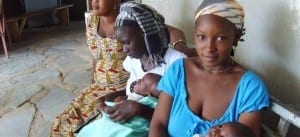
The Ebola crisis highlights how women’s dual roles as workers and caregivers puts them on the frontlines of low-wage, unsafe work. Credit: Impatientoptimist.org
Unions worldwide are mobilizing around World Day for Decent Work, held annually on October 7 to raise public and official awareness of the critical need for labor rights for the vast numbers of workers who toil in unsafe, unhealthy conditions; receive wages that cannot sustain them and their families; have no voice at work through union representation; and no access to retirement security, health care or other fundamental protections.
Some 39 percent of the global labor force—1.2 billion women and men—live in poverty, surviving on less than $2 a day per person. With fewer jobs available in the formal economy, millions of workers are forced to survive by laboring as street vendors, domestic workers and cab drivers. The vast majority of these informal economy workers are women.
In fact, gender equality is at the heart of decent work. Working women—and the caring work women do, such as taking care of the family and running the household—are central to enabling communities to function and thrive. Yet women work in the lowest-paid jobs, have less access to union representation, and often suffer from violence and other abuses both at work and in the home.
The ongoing Ebola crisis highlights the extent to which women workers are on the front lines, performing difficult tasks in dangerous and even deadly environments: In the 2001–2002 Ebola outbreak, 75 percent of people killed by the virus were women. In the current epidemic, women account for more than half of all Ebola cases throughout West Africa, while in Liberia, up to 75 percent of those killed by Ebola have been women.
Women have disproportionately contracted Ebola for reasons that illustrate the extent to which women have been denied decent work.
Women predominate in the health care sector, where in West Africa they care for Ebola patients in facilities that do not have proper protective equipment and procedures. Women serve as primary caregivers at home, where they are exposed to the deadly disease while nursing loved ones who have fallen ill. And women, many of whom are principal or sole economic providers for their families, are disproportionately poor and are concentrated in the low-wage informal sector, where there is little or no access to health insurance or the financial resources that enable them to take precautions against the virus.
In Liberia, 30 percent of households were headed by women in 2009, and 90 percent of Liberian women workers toil in the informal economy or agriculture, according to the World Bank. Research in Guinea has shown that the load of family and professional activities on women translates to 15 hours to 17 work hours a day.
Seriously examining why women disproportionately contract Ebola would mean “tackling systemic problems, such as women’s unequal access to adequate health care or the finances they might require for treatment,” writes Lauren Wolfe, director of Women under Siege, a journalism project on sexualized violence. “In short, it would mean challenging fundamental and dangerous disparities.” The same inequalities that result in a lack of decent work for women.
As Columbia University epidemiology professor Wafaa El-Sadr told Wolfe: Looking at who dies in an outbreak “shows you who has power and who doesn’t.

Sep 15, 2014
Unions in Liberia and Nigeria are teaching union members, their families and local communities how to prevent transmission of the Ebola virus and speaking out on behalf of health care and other front-line workers.
The United Workers’ Union of Liberia (UWUL) and the Firestone Agricultural Workers Union of Liberia (FAWUL) announced a joint action plan last month and are currently directing community-based health education trainings for protection against transmission of Ebola virus disease (EVD).
The Movement for Labor Rights and Justice (MOLAJ)—a grassroots organization with links to UWUL and FAWUL—is providing Ebola awareness training, disinfectants and hand-washing buckets to Liberian communities.
“We wants to use [MOLAJ] to launch an S.O.S. call to all our partners to assist in any way possible to combat this dreadful EVD in our country to save the lives of workers and their families,” says David Sakoh, UWUL general secretary. MOLAJ’s efforts were boosted by a $15,000 donation from the United Steelworkers (USW) last month.
An effective union response is critical in Liberia. The World Health Organization (WHO) concluded last week that—with 14 of Liberia’s 15 counties having confirmed cases—the Ebola outbreak has completely outstripped the Liberian government’s ability to respond.
Unions in Nigeria are playing an important role in getting information to the grassroots about how to prevent Ebola infection and taking the lead in pressing for protection protocols for healthcare and other front-line workers.
The National Association of Nigerian Nurses and Midwives (NANNM), the Medical and Health Workers’ Union of Nigeria (MHWUN), and the Union of Textile Garment and Tailoring Workers of Nigeria (NUTGTWN) are conducting trainings for members as well as providing train-the-trainer workshops in communities, so as to broaden their outreach and better equip workers and communities to fight the infection.
The Nigeria Labor Congress (NLC) and several Nigerian sector unions are also distributing posters and handbills that explain Ebola and how workers can protect themselves and care for others, through local branch offices. In addition, the federation and several sector unions are calling for personal protective devices for at-risk workers and for the government to issue standard protocols for health care and other workers likely to be exposed to the virus—including port workers, air transportation workers and border workers. Unions representing healthcare workers are distributing union-printed copies of a WHO document providing infection prevention techniques for healthcare workers.
Last month the WHO reported that 12 Ebola cases were successfully contained within Lagos. Recently, though, several cases were confirmed in Port Harcourt, Rivers State. By September 8, 477 people were under quarantine in Port Harcourt and by last Friday that number had risen to 490.
The Ebola outbreak has killed more than 2,000 people across West Africa, including Liberia, Guinea, Sierra Leone and Nigeria and Senegal. Last week the WHO estimated that as many as 20,000 people in West Africa may become infected.
Mar 11, 2014
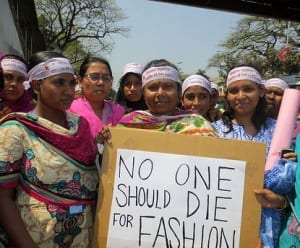
In Bangladesh, BCWS Executive Director Kalpona Akter rallied with garment workers on International Women Day. Credit: Solidarity Center
Hundreds of workers from multiple garment factories rallied in recent days at the National Press Club in Dhaka, Bangladesh, where they formed a human chain and demanded equal wages, equal rights and equal dignity for woman workers in the ready-made-garment (RMG) sector. The action was among many around the world throughout the past week as women workers and their allies commemorated International Women’s Day, held annually on March 8.
In Chittagong, where workers from 16 garment factories marched and rallied, Bangladesh Independent Garment Union Federation (BIGUF) Chittagong President Nomita pointed out that nearly all who took part were women.
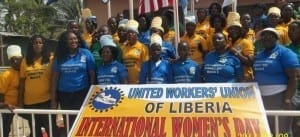
Liberian trade unionists celebrate International Women’s Day 2014. Credit: Solidarity Center
“I can’t imagine trade unions without women,” she said. Nomita urged RMG factory owners to fully implement maternity leave and establish child care centers in factories. In addition to BIGUF, other Solidarity Center allies taking part in International Women’s Day actions in the country included the Bangladesh Center for Worker Solidarity (BCWS), the Bangladesh National Garments Workers Employees League (BNGWEL), the National Garment Workers Federation (NGWF) and Sommilito Garments Sramik Federation (SGSF).
Elsewhere around the world, Solidarity Center allies marked International Women’s Day by celebrating, educating and mobilizing.
• In Tunisia, the Union Générale Tunisienne du Travail (UGTT) held a solidarity march for Palestinian women and repressed women around the world. The March 8 event took place on the main avenue in Tunis, the capital, and concluded at the UGTT center with music, cultural activities, poetry and an exhibit on the history of women’s activism in Tunisia. The event followed a roundtable on a comparative study of women’s rights in the country’s three constitutions.
• Moroccan union activists and members of the Confederation Democratique du Travail (Democratic Labor Confederation, CDT), took part in trainings that covered women’s legal rights and they also held artistic and cultural events, concluding with a ceremony honoring social activists and retired women. The Union Marocaine du Travail (Moroccan Workers’ Union, UMT) combined a celebration of Women’s Day with events marking the 59th anniversary of its founding congress. Later this month, UMT will host a roundtable discussion on the role of women in the union and strategies for broadening women’s participation in the union.
• The Border Committee of Women Workers (Comité Fronterizo de Obreras, CFO) held a mini-workshop for women participating in the Solidarity Center’s Gender and Women’s Empowerment for Action program in Coahuila, Mexico. The discussion focused on how International Women’s Day is more than a time for women to receive feel-good gestures like a flower or nice words on Facebook from the men in their lives. In Mexico, where women disproportionately bear the brunt of the country’s economic and social insecurity and violence, Women’s Day offers a space for women and girls to evaluate how far they’ve come and how much further they still must go to win equality with men and boys and achieve justice in all areas of their lives.
In Liberia, women and their allies held a parade to the United Workers Union of Liberia (UWUL) office, where they raised flags in recognition of labor partner organizations such as the United Steelworkers and IndustriAll that implement programs to help female unionists to become a strong force in Liberia.
• Across South Africa, the Solidarity Center joined with Labour for Rights for Women (LRW) campaign and the Labour Research Service (LRS) to host two events. In North West Province, the organizations convened health care workers, farm workers and domestic workers in a meeting with local civil society organizations and the South African Department of Health to discuss the impact of a new government health insurance plan, especially its impact on women workers. In Limpopo Province, the LRW held a training session for union gender coordinators, organizers and negotiators on maternity protection. The LRW, sponsored by the International Trade Union Confederation (ITUC), brings together South Africa’s labor federations to support improved respect for women’s rights at the workplace and their greater participation in union activities
Mar 7, 2014
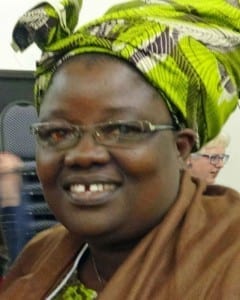
Oretha Tarnue, vice president of the United Workers Union of Liberia (UWUL). Credit: Tula Connell/Solidarity Center
Each day this week leading up to International Women’s Day March 8, the Solidarity Center will highlight an example of how women and their unions are taking action to improve women’s lives on the job, in their unions and in their communities.
Oretha Tarnue, vice president of the United Workers Union of Liberia (UWUL) and a former domestic worker, is spearheading a drive in her country to organize domestic workers who, like their counterparts elsewhere, are routinely exploited by their employers.
In Liberia and in other countries, the overwhelming majority of domestic workers are young women who view the work as an opportunity to earn a living, but too often find themselves vulnerable to abuses—from low wages and long hours to physical and sexual abuse and human trafficking.
Tarnue, who is also a lead coordinator for the Domestic Workers Union of Liberia (DOWUL), says the workers, mostly women, are paid between $21 and $50 per month, which is barely enough to buy a bag of rice. The country’s minimum wage is $2 a day.
Solidarity Center staff spoke with Tarnue about the challenges involved in connecting with domestic workers to help them understand their rights as workers, join together to improve their working conditions and convey to lawmakers and the public that domestic workers perform real work, and have the same rights as and deserve labor law coverage equal to all other wage earners.
Solidarity Center: How did you get involved with the domestic worker union?
Tarnue: I thought there was a need to organize domestic workers. I have worked as a domestic worker and in our labor laws, domestic workers are not (recognized). We went from home to home and other places, like hotels, where domestic workers are not recognized, and we began to talk to people. (With) the Solidarity Center and the United Steelworkers (USW), we had a training where we selected domestic workers from different communities. We had a good training that led those coordinators to go out and organize and recruit members.
Solidarity Center: What was your experience as a domestic worker?
Tarnue: There’s no scope of work, there’s no term of reference. Domestic workers’ contract is a verbal contract and domestic workers are not (recognized) under the labor law so they are at the discretion of the boss.
Solidarity Center: How do you reach out to domestic workers?
Tarnue: We go out and speak to workers at their workplaces or meet them during their breaks of off hours. We are able to teach them at the level they’ll understand. Teach them their human rights, their physical rights, their moral rights. The basis of our training to domestic workers is to know their rights as human beings. They are entitled to their human rights, and we teach these things to them.
Solidarity Center: Has all this made a difference?
Tarnue: It has made a difference because, as we speak, our 30 coordinators (who are domestic workers) have been able to (challenge) their own bosses.
Solidarity Center: Really?
Tarnue: Yes. Their own bosses! This comes from the Solidarity Center and USW training! We tell them to not be violent, not be rude, but you can peacefully engage your boss. Access the boss’s’ leisure time and discuss issues relating to work time, to terms of reference, scope of work, wages. Lay them down one at a time and go into discussion. These 30 coordinators have been able to increase their wages just by having a discussion with their bosses. This lets us know that the training has been working.
Solidarity Center: In the next five years, what do you envision for DOWUL?
Tarnue: We are 100 percent optimistic that domestic workers are going to be fully unionized and (added) into Liberia labor law and a collective bargaining agreement is going to be done for the domestic workers. That’s our hope because domestic workers are like any other workers. They should be treated like any other worker on Liberian soil.
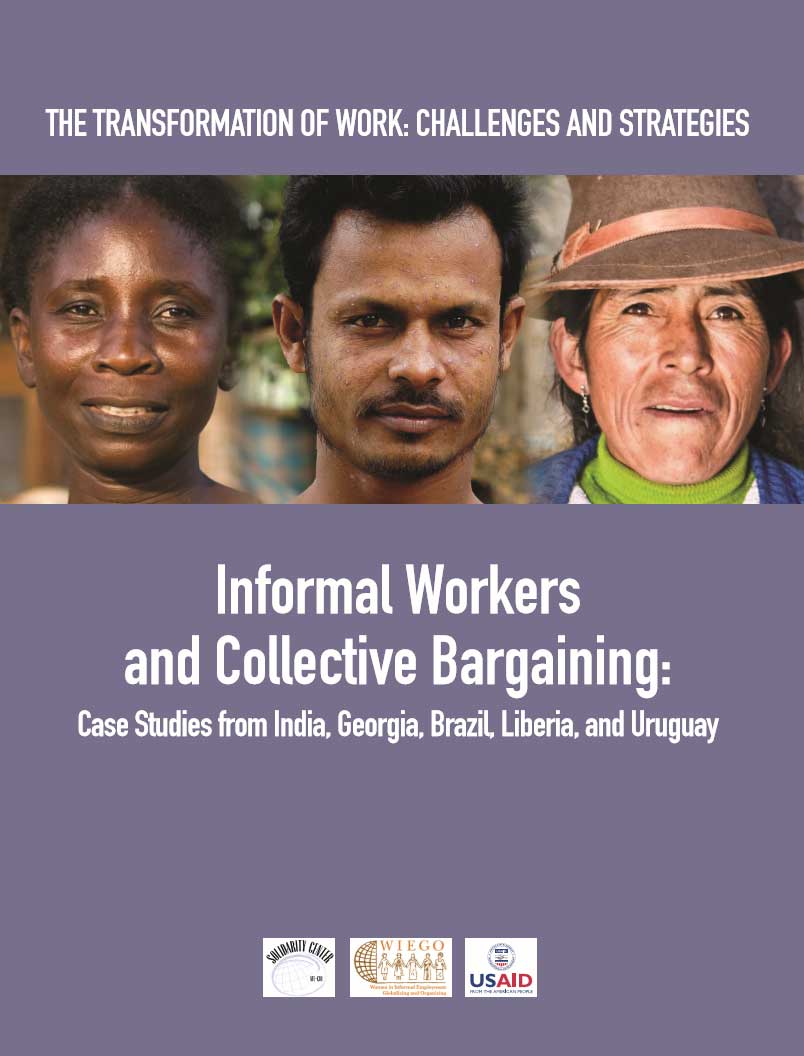
Sep 24, 2013
This report details a set of case studies on collective bargaining by informal workers in four different countries: Waste pickers in Minas Gerais state in Brazil, beedi workers in India, Georgia minibus taxi workers and street vendors in Monrovia, Liberia. The study also references the efforts of domestic workers in Uruguay.
Download here.






